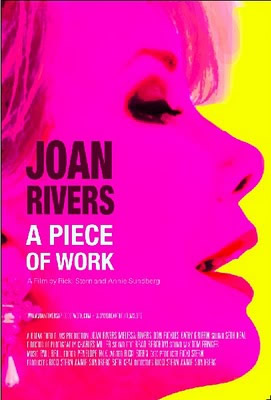Viewers (much like this writer) who have grown to identify Joan Rivers with plastic surgery, jewelry sales on QVC, and red-carpet banter are in for a surprise with the humorous and engrossingly honest documentary Joan Rivers: A Piece of Work. Through a family connection, directors Ricki Stern and Annie Sundberg were able to gain access to capture an incredibly intimate portrait, showing an the ups and downs of compulsive celebrity and this complicated life. The cameras follow Rivers for a year, beginning on her 75th birthday.
The film opens with a merciless close-up of Rivers, in the morning moment right before her makeup is applied. There is a sense of unapologetic candor in this shot, as we see the real Joan right before a thick application of makeup is applied. Slowly we see her transformed into the Joan we know, with the artificial golden glow hiding the years underneath. The theatrical feel of this transformation feels very much like one’s preparation before they go on-stage, which might be a sense of comfort for Rivers.
“When I am onstage is the only time I am truly happy,” she confesses. Sadly, that appears to be true. When on stage, she comes alive under the lights, seeming to thrive on the attention, laughter, and love of each audience.
Born in 1933, Joan Rivers grew up as Joan Molinsky, a dark-haired girl with a big nose. From a very young age, Rivers was self-conscious about her looks, and felt that others agreed with what she saw as her shortcomings. To the camera, she recounts how her mother used to assure her that “looks don’t matter,” which she accepted as meaning she was ugly and they all knew it. And so the surgeries began, revealed in the footage of her first television appearances, when Rivers is in her early 30s, with her nose having gone through its first transformation.
It’s very easy to criticize the overuse of plastic surgery, but there is also something hauntingly sad in not being able to appreciate the face that stares back at you in the mirror. “No man,” Joan says, at one particularly heartrending moment, “has ever told me I looked beautiful. Oh, they say, ‘You look great!’ But never beautiful.”
Along with chronicling of the year, archival footage from her 40-year history on camera fills in the story with interesting personal moments. One of the most heartfelt is her recounting of the moment she had a fall out with Johnny Carson, from being his close friend and constant show guest to being completely cut-off from contact with him after she pursued her own ill-fated late-night talk show on a rival network. Rivers also discusses the tragic tale of her husband, Edgar, from the rise of their love, to his fall into a suicidal depression.
With a glimpse into Rivers’s life comes a glimpse into her home: a gilt-and-crystal Manhattan apartment with Rivers describes as “where Marie Antoinette would live if she had the money.” She lives a life of extreme luxury, seeming to fill an emotional void with material possessions, and with such a life comes with a hefty price tag. At one point she shows the camera the blank pages in her appointment book, which has a sense of gravity in that Rivers recognizes lack of bookings as not only loss of interest in her (a fact which she finds quite devastating) but also a potential end to the lifestyle she is accustomed to. She holds up a blank page and states, “I’ll show you fear.”
Biographical documentaries are always revealing, but the really good ones can turn you on your head, bringing the subjects into a new light. Yes, Rivers is rude, offensive, and cosmetically enhanced, but underneath that makeup cover is a fragile, lonely soul who spends Thanksgiving delivering meals to the sick. Indeed, she is a piece of work.
7 out of 10
What do you look for in a biographical documentary? Do you plan to see this one?


